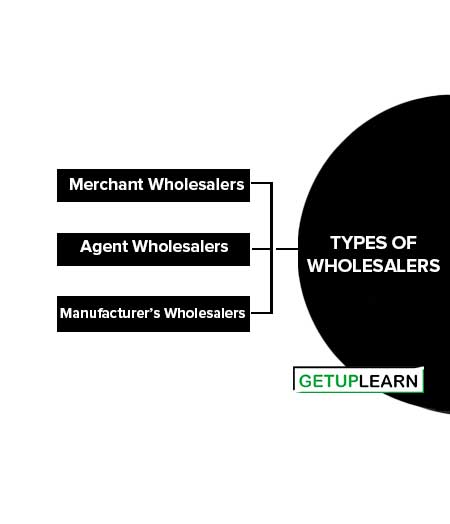Table of Contents
Types of Wholesalers
The evolution of distribution channels was accompanied by the introduction of several intermediaries in the distribution channel to make the products easily available to the end users.
The period also saw an increase in the types of intermediaries to meet the growing needs of the customers as well as producers. Types of wholesalers can be divided into three broad categories:

Merchant Wholesalers
Merchant wholesalers take over the title of ownership to the goods from the producer and are responsible for the stock owned. They buy and assemble goods in large lots and resell them in small quantities to retail outlets, and industrial, commercial, or professional users through salesmen.
They sell and buy in the domestic market on their own account and make payments to the manufacturer for the goods purchased. Merchant wholesalers perform various functions of wholesaling such as extending credit to customers, delivery and merchandise servicing, and rendering trade-related advice.
Based on the range of services or functions they perform, merchant wholesalers can be further classified into:
Full-Service Merchant Wholesalers
Full-service merchant wholesalers full-service wholesalers provide most of the services of a wholesaler like storing, delivery, providing credit facility, warehousing, taking title to goods, etc.
-
General Merchandise Wholesalers carry a wide range of products that are resold to retailers. They mostly cater to the needs of small retailers and carry almost all the products that customers need.
-
Limited-line wholesalers offer a narrow range of products to retailers. They create an extensive assortment of products that are purchased from different producers and make them available to retailers and other organizational customers.
- Specialty line wholesalers carry a very specialized range of products, which is usually a single product or a few products from a product line. Examples of specialty line wholesalers are tobacco wholesalers, hardware wholesalers, etc.
Limited-Service Merchant Wholesalers
Limited-service merchant wholesalers Limited-service merchant wholesalers do not undertake all the functions of a wholesaler. They specialize and so offer only limited services to retailers. They include cash & carry wholesalers, drop shippers, rack jobbers, and truck jobbers.
-
Cash & carry wholesaler maintains warehouse where retailers use their own trucks to pick up merchandise. Neither transportation nor credit is provided. Lower prices are offered because of the limited services.
-
Drop shipper takes the order from retailers and arranges for delivery of goods directly from the producer. They take ownership but not possession. Freight costs are minimal. Sometimes they operate with a small office and phone. They deal with bulky items such as lumber and coal.
-
Rack Jobber sells specialized lines of merchandise to retailers. Common in the food industry, the rack jobber supplies non-food items, such as greeting cards. They assume ownership, order the merchandise, set up displays, remove old merchandise, and mark prices. Sometimes the retailer pays the rack jobber in cash for the items sold.
- Truck jobber uses trucks for storage, selling, delivery, and collection. Both sales and delivery are made to the retailer on the same trip. The truck jobber sells for cash and limits stock to nationally advertised specialties and fast-moving items, such as candy, cheese, and potato chips. Their costs are usually high.
Agent Wholesalers
Agent wholesalers do not take title to the goods. Their main function is to assist the manufacturers and the retailers in the buying and selling process.
Broker
A broker can represent the buyer or seller. They do not physically handle the goods or take ownership. Only brings the buyer and seller together.
- Usually specializes in one type of product such as real estate, securities, or some food items that are seasonal and don’t have long before they spoil – the distribution must be fast and short.
- They may not continue relationships with the buyer after a transaction.
Selling Agent
Selling agent product specialist of only one product from one manufacturer, such as sound systems for a sports complex.
- They have the authority to make deals for the manufacturer and usually maintain an educated sales force regarding the product.
- The goods they sell usually are not kept in a warehouse but are shipped directly from the manufacturer to the final end customer.
Manufacturer’s Agent
Manufacturer’s agent – handles part or all of the output of one or more manufacturers within a given sales territory. They do not have the authority like the selling agent to make deals with the customers. They are bound by prices and conditions set by the manufacturers.
Manufacturer’s Wholesalers
Manufacturer wholesalers perform the same set of functions as merchant wholesalers. These intermediaries are owned and operated by the manufacturers themselves.
Manufacturers often undertake wholesaling operations through sales branches and sales offices in order to have control over inventory, selling, and promotion. Westinghouse Electric Supply Company and General Electric Supply Company are examples of manufacturer’s sales branches in electrical equipment.
